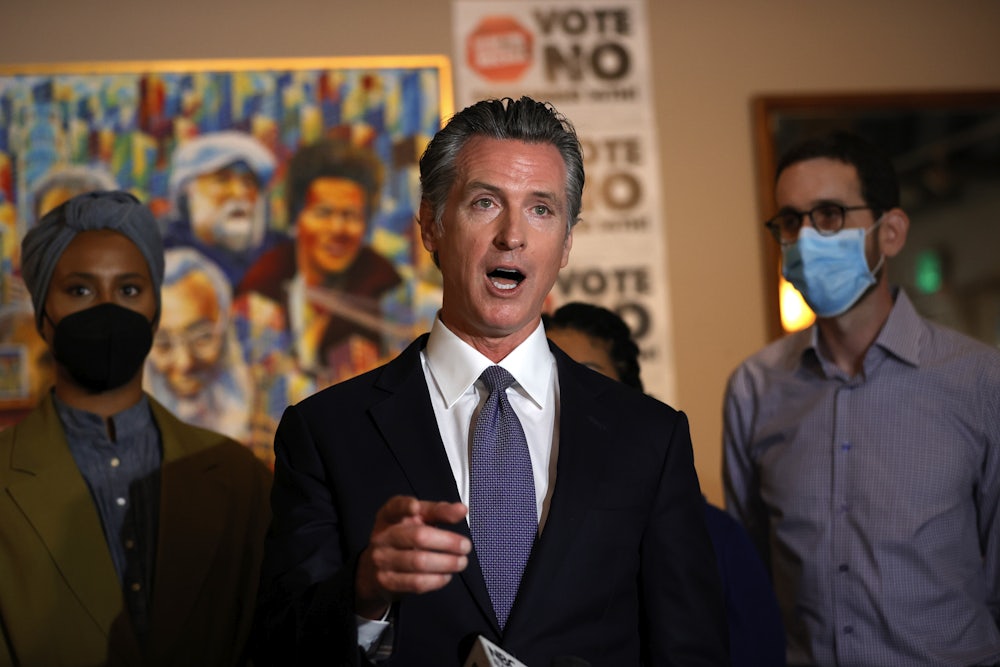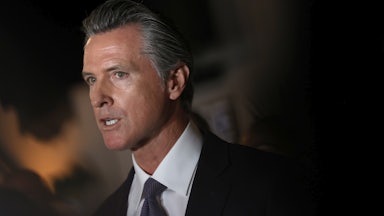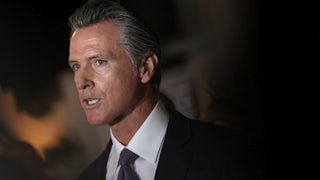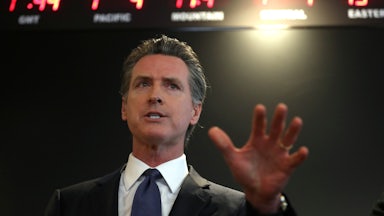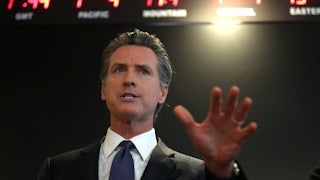In the last few days before the recall election that will decide whether Governor Gavin Newsom, who was democratically elected less than four years ago, can stay in office, Newsom and his team are increasingly leaning on the progressive wing of the Democratic Party to keep him in office.
And liberal darlings and groups are answering the call. But their motivation in doing so is likely less about keeping Gavin Newsom in the governor’s mansion and more about keeping a Republican out of it—specifically, the scenario where reliably Democratic California suddenly has a Republican governor and 88-year-old Senator Dianne Feinstein leaves office in the middle of her term, which ends on January 2027.
Newsom has gotten the kind of national Democratic star power most candidates dream about. It’s been a procession of support from the likes of Senators Elizabeth Warren and Bernie Sanders as well as Stacey Abrams, among others. And Vice President Kamala Harris had been set to join an event for Newsom before world events led to her canceling, though that’s less surprising, since Harris is a Californian.
And on Thursday evening, Newsom was the headliner at an anti-recall phone-banking event organized the progressive outside group MoveOn. Newsom doesn’t have much of a prior history with MoveOn. The organization didn’t endorse any candidate in the 2018 Democratic primary for governor. But now it’s taking an active role in working to keep him in office.
“The stakes are profoundly high,” Newsom said to the online MoveOn audience in a rambling speech. “I know my name appears on the ballot—I’m mindful of that. But our values are on the ballot—social justice, economic justice, all of the incredible work we’ve done to advance the collective cause across a spectrum of issues here in this state, the most diverse state in the world’s most diverse democracy.”
Earlier on Thursday, news broke that Warren would travel to Los Angeles on Saturday for a joint campaign rally with the first-term governor in opposition to the recall effort. Warren has previously penned a fundraising pitch for Newsom in that same vein. One of the few politicians with the same stature within the liberal movement of the party, Sanders has also starred in a television and digital ad voicing support for Newsom during the recall effort.
“They’re trying to put this on the map for Democrats and say, ‘This is important, you have to go vote,’” said Buffy Wicks, a California state assemblywoman. Because Covid-19 has become so politicized, it’s helped the far right to be very politically active—even in California, Wicks continued. “I think what Gavin’s trying to do now is say, ‘OK, big-tent Democrats; OK, Berniecrats and Elizabeth Warren Democrats … we need you to pay attention and engage now and go out and vote.’”
In response to a question about whether Sanders, too, would travel for an in-person appearance, the Vermont senator’s office said only that there was “nothing to announce right now”—leaving open the possibility that Sanders could travel to California for a last-minute boost against the recall.
Newsom is hardly the go-to elected official for progressives. But he’s also not the kind of Democrat whom that wing of the party would find most objectionable. Under Newsom, California has avoided some of the worst aspects of the Covid pandemic, partially because he was quick to issue a shelter-in-place order. Under his tenure California Democrats in office have expanded paid family leave and doubled the state’s earned-income tax credit. He also signed a law that let transgender inmates in California be put in prisons that match their gender. He’s struggled more on housing policy, as well, and there are plenty of promises he has made to liberals that haven’t been fulfilled.
But at the end of the day, the prospect of Newsom being replaced by right-wing radio host and provocateur Larry Elder or the dozens of other candidates on the ballot is a powerful motivator for uniting Democrats across the country behind the first-term governor.
In this case, the way the recall is set up, it’s possible for one of the 40-some other candidates to win with a small plurality. The recall election works in two parts. The first vote is on whether Newsom should be recalled. The second vote is on who should replace him. So it’s possible for someone like Elder to have only a tiny sliver of support but enough of a plurality—if Newsom is recalled—to become governor in the end.
Elder has a long history of making outlandish and unsubstantiated claims, such as that children don’t need to be vaccinated or wear masks in schools. In a normal California election, that would be a nonstarter for viability, especially among an electorate that’s increasingly concerned about vaccinations. But the way the recall is set up, Elder and others are still viable.
“This election is not just about Newsom, this is about making sure that we hold onto a governorship, for Democrats,” said California-based Democratic pollster Ruth Bernstein. “It also has an impact on the Senate, and what we can get done in the legislature.… So if you are a progressive legislator in California, you don’t want someone else in the governorship. You’re never going to get anything passed.”
And the stakes are high in both California and nationally. It’s possible that California’s governor will have to pick a successor for Feinstein, sometime within the next few years, if she becomes ill and retires or dies. That’s something a lot of people don’t want to talk about openly, but it’s certainly something that White House officials are reportedly concerned about (although one official stressed to me that it is not the most pressing concern at the moment).
Newsom actually already has a track record on appointing senators. When Harris became vice president, Newsom’s replacement pick made history as the state’s first Latino senator and, of course, a Democrat. If another vacancy opened up, Newsom would pick yet another Democrat. It’s safe to say that a Governor Elder or another Republican running in the recall would pick a conservative that the state’s Democratic population and the progressive community at large would find abhorrent. In that scenario, Democrats’ razor-thin majority in the Senate would almost immediately be erased and with that any hope of Joe Biden passing any more big legislation.
There are stakes that matter statewide to Californians, as well. For the progressive wing of the party, the recall process has distracted from a golden opportunity to push proposals on immigration, Medicare for All, and wealth taxes—which haven’t gone far in Newsom’s first two years. Now the choice is: keep that window open or watch it slam shut with a new governor.
“Of course it’s serious,” Sandra Lowe, a California Democratic National Commiteewoman, said of the recall. “You have to take these kinds of things seriously. This is California. It’s the home of the recall.… People are—they’re beat up. They’re angry. And so you have take it seriously, and I think the governor is taking it seriously.”
There’s no denying that Newsom has brought a lot of this on himself with missteps that were totally avoidable. There was dining without a mask at the uber-expensive French Laundry restaurant, where dinner runs about $350 a head. There was the hullaballoo over one of Newsom’s children being photographed without a mask at a summer basketball camp. And more recently, the governor sold his Marin County home in an off-market $5.9 million deal—another reminder to Californians that Newsom is a long way from being everyone’s everyman.
The recall effort has been serious, but Newsom still may overcome it. A Public Policy Institute of California poll released Wednesday night found Newsom overcoming the recall 58 percent to 30 percent among likely voters. Still, Democrats see a national lull in enthusiasm on their side and a spike among Republicans. Newsom himself has experienced a drop in approval rating since last September, when it was 64 percent. In July, Newsom was at 50 percent, according to The Financial Times.
There are a little less than two weeks to go before the recall. Newsom, who from even before he became governor was seen as an incredibly handsome future standard-bearer for the Democratic Party (and maybe the country) now finds himself with dings from multiple corners of his own party. But once again, whether he wins or loses, an election has outsize implications for not just him but the entire Democratic Party.
